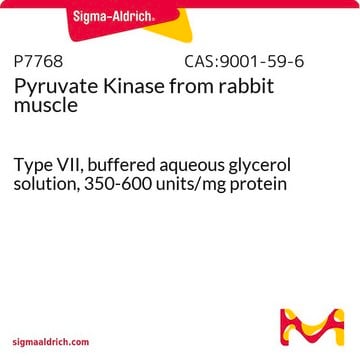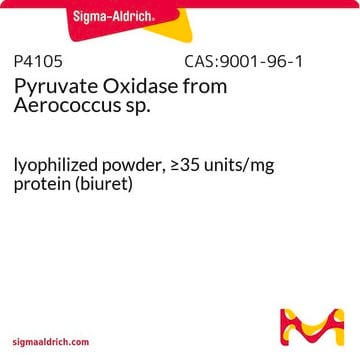P1903
Pyruvate Kinase from Bacillus stearothermophilus
Type VIII, lyophilized powder, 100-300 units/mg protein
Synonyme(s) :
ATP:pyruvate 2-O-phosphotransferase, PK
About This Item
Produits recommandés
Source biologique
Bacillus sp. (B. stearothermophilus)
Niveau de qualité
Type
Type VIII
Forme
lyophilized powder
Activité spécifique
100-300 units/mg protein
Température de stockage
2-8°C
Description générale
Mammalian pyruvate kinase is a tetrameric protein composed of identical subunits organized in a dimer-of-dimers configuration. Four isoforms of pyruvate kinase exist in mammals, namely PKM1, PKM2, PKR, and PKL. Pyruvate kinase can be found in both tetrameric and dimeric forms.
Application
Actions biochimiques/physiologiques
Pyruvate kinase is a key regulator controlling metabolic flux and ATP production in glycolysis and is considered a potential drug target. Additionally, pyruvate kinases are subject to regulation by heterotropic effectors, with fructose 1,6-bisphosphate (FBP) being the most widely known allosteric activator of bacterial, yeast, and mammalian enzymes. Furthermore, PKM2, one of the four isoforms of pyruvate kinase, is extensively expressed in various types of tumors and is associated with tumorigenesis.
Définition de l'unité
Forme physique
Remarque sur l'analyse
Code de la classe de stockage
11 - Combustible Solids
Classe de danger pour l'eau (WGK)
WGK 3
Point d'éclair (°F)
Not applicable
Point d'éclair (°C)
Not applicable
Équipement de protection individuelle
Eyeshields, Gloves, type N95 (US)
Certificats d'analyse (COA)
Recherchez un Certificats d'analyse (COA) en saisissant le numéro de lot du produit. Les numéros de lot figurent sur l'étiquette du produit après les mots "Lot" ou "Batch".
Déjà en possession de ce produit ?
Retrouvez la documentation relative aux produits que vous avez récemment achetés dans la Bibliothèque de documents.
Les clients ont également consulté
Notre équipe de scientifiques dispose d'une expérience dans tous les secteurs de la recherche, notamment en sciences de la vie, science des matériaux, synthèse chimique, chromatographie, analyse et dans de nombreux autres domaines..
Contacter notre Service technique












